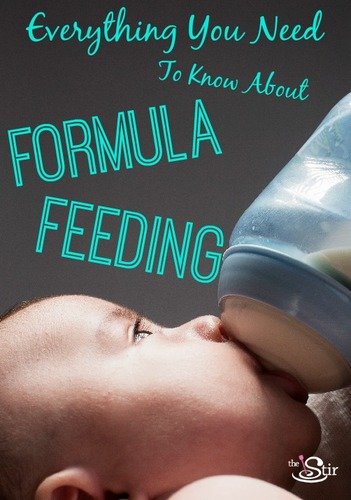The American Academy of Pediatrics (AAP) recommends breastfeeding for at least the first 6 months of baby's life, but let's be honest, that's not an option for every mom. Bottle-feeding moms can take comfort in the fact that formula is a "nutritious, healthy alternative to breast milk," according to Erin Frank, MD, a pediatrician at University Hospital Rainbow Babies Children's Hospital in Cleveland, Ohio. And it's a choice they shouldn't feel guilty for making.
But feeding a baby formula can be confusing for new moms. How do you sterilize the bottles? What brand should you choose? How much should you be feeding your baby? We've got the answers to moms' most common questions about formula.
Q. Is formula as good for my baby as breast milk?
A. "It's impossible to duplicate breast milk, but companies work hard to make sure formula is as close to it as possible," notes Dr. Frank. But it's important to know that the proteins found in breast milk are more easily digested than the ones found in formula or cow's milk. Human milk also contains more whey protein than formula, which is said to have great infection-protection properties. But although no commercial formula has been able to duplicate the immune-protection properties of breast milk, formula-feeding parents can use common sense when it comes to their baby's health to help bridge the gap: keep them out of germ-laden areas; keep baby away from sick people; and make sure everyone washes their hands before touching baby.
Q. What brand of formula is best?
A. "There isn't one brand that's good, and one that's bad," says Dr. Frank. "Everything is extremely closely regulated, but it's best to start off with a standard cow's milk-based one." Brand names don't matter. If cost is an issue, it's okay to use a store-brand formula. And if you want some reassurance, ask your pediatrician what brand she recommends.
Q. Do I have to go organic?
A. Like all organic foods, the ingredients in organic baby formula haven't been exposed to pesticides, herbicides, or other chemicals during their growth. So if you eat organic, you'll likely want your baby to do so for the same reasons. Note that organic formula can be about 30 percent more expensive than regular formula. For example, a 1.45-lb. container of one brand's organic powder costs about $27.49, where a container of the same weight for the same brand's non-organic powder costs about $24.99.
Q. What's the deal with soy-based formula?
A. "Soy formula is just as nutritious in terms of calories," explains Dr. Frank. "But it's plant-based, so it may be a good option for families with vegetarian or vegan lifestyles." Parents with fussy babies sometimes switch from cow's milk to soy-based formulas, but typically, fussiness isn't caused by a type of formula. "You want to avoid frequent switching," cautions Dr. Frank. If you've taken it upon yourself to switch from cow's milk to soy, and your baby seems to be tolerating it, that's fine. But if you are thinking of switching back again, it's best to discuss it with your pediatrician first.
Q. Does it matter whether I choose liquid or powder?
A. "Powder and liquid formula are the same nutritionally for calories and growth," notes Dr. Frank. "Most parents choose powder, as it's the most readily available, but there is no difference." Powdered formula is also cheaper, so that's a plus.
Q. How much formula should parents feed their babies?
A. "Feed on demand and follow hunger cues," suggests Dr. Frank. Typically, newborns will take about 1 to 2 ounces a feeding, 10 times a day, and it will go up from there. Early on, babies rarely need more than 20 to 24 ounces in a day.
Q. How do I clean and sterilize bottles? Is the dishwasher okay?
A. Before you use bottles and nipples for the first time, sterilize them. Your grandmother might tell you to boil all bottle parts, but according to the AAP, that's not really necessary. Simply put bottles and nipples in a dishwasher that uses heated water and a hot drying cycle, or hand wash them with warm, soapy water. After each use, wash bottles and nipples with warm soapy water.
Q. What's the best way to heat up formula?
A. Parents are strongly urged against using microwaves to heat bottles, as the uneven heating can burn baby's mouth. They should either bring cold tap water to a rolling boil for 1 minute (no longer), then cool the water to room temperature for no more than 30 minutes before adding it to powder formula; or, if they have sterile, room temperature water on hand, simply mix it with the formula and feed it to baby. Cold, liquid formula can be heated by either using a bottle warmer, or by placing the bottle in a pan of warm water. Bottles should always be tested in advance to make sure it is not too hot for the baby. The easiest way to test the temperature is to shake a few drops on the inside of your wrist.
Q. How can moms store a undrunk bottle of formula?
A. "Parents shouldn't reuse a bottle of formula," says Dr. Frank. Once your baby is done, you should discard of the rest. Hence, it's best not to make more than you think your baby will drink.
Do you have any formula-feeding tips to add?





